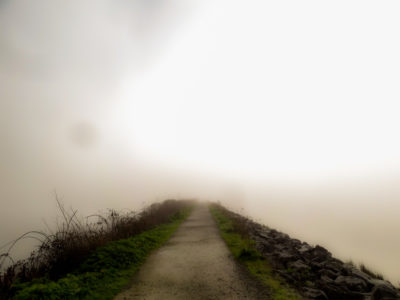The other day a client said something I’ve heard repeatedly throughout the years and understand deeply, “I never worried like this, until (insert tragedy here/loss of loved one) and now I have so much more fear and anxiety.” A parent who has lost a child or partner, now knows that life is tenuous. Children who have experienced divorce/tragedy, now know that things can fall apart. Those who’ve experienced life threatening danger, car accidents, sexual assault, and such, know that everything can turn upside down in a second. And then there are systemic racism and childhood abuse (physical/sexual/emotional) and neglect, where some understand a constant threat to their lives, a pervasive lack of safety and generational experience of terror.
never worried like this, until (insert tragedy here/loss of loved one) and now I have so much more fear and anxiety.” A parent who has lost a child or partner, now knows that life is tenuous. Children who have experienced divorce/tragedy, now know that things can fall apart. Those who’ve experienced life threatening danger, car accidents, sexual assault, and such, know that everything can turn upside down in a second. And then there are systemic racism and childhood abuse (physical/sexual/emotional) and neglect, where some understand a constant threat to their lives, a pervasive lack of safety and generational experience of terror.
Which brings me to trauma brain and body. I often have clients who have experienced complex trauma tell me I am the first counselor who truly understands what they are struggling with. This is mainly because I know early childhood trauma and its impacts deeply beginning with my first weeks of life in an incubator, to an abusive home, and my journey in foster care with years of grief/loss. Such experiences literally change the wiring of the brain and the physiology of the body to respond more vigilantly toward self-protection and survival. (I’m calling it trauma brain as shorthand as I don’t diagnose or label, though more extreme experiences of longstanding childhood abuse are also referred to as developmental PTSD.)
I did my best, I fared better than most in my situation, and have healed much of this wounding, but not a day goes by that I don’t experience the way my brain and body has been altered due to trauma. Every day that I let my children go to the lake, or drive in a friend’s car, or simply sometimes leave my side, there are many moments when my knowledge that “bad things can happen” and “it can all fall apart” scream loudly and I have to hold my inner child and bring my spiritual guidance through to let her know “it will probably be okay.” The ability to say it with utter confidence is long gone. I don’t suffer the illusion of the America of the privileged or those in denial.
What I have noticed is this level of trauma either does the above, OR it deepens one sense of denial. Only those who haven’t experienced it OR cope by pushing it all down, can live in the place of “it will be okay” and usually this is just a surface mask, often pronounced as ‘have faith,’ ‘think positive’ and other forms of spiritual bypass. I do practice faith and surrender by trusting my ancestors/spiritual connection, it’s how I live my life and what I teach, but I also recognize that I live in the other America. The America where bad things happen to good people, sometimes sporadically, sometimes generationally, and sometimes systemically because our capitalist system is not designed to care for everyone. (In fact it is designed to leave out 10-12% of the population which is why safety nets are essential and it was literally built by slavery and genocide so it NEVER was/is for everyone–macroeconomics 101).
For years, our extended family has gone on a rental boat in a big lake, where the kids take turns being pulled while sitting on a floatie thing. For years, I went along with it because it’s what everyone wanted, but sitting on that boat, while my less traumatized extended family and children enjoyed themselves gleefully, I was literally TERRIFIED that my baby who could not yet swim would fall out of the boat and sink down deep into the lake. I would be tense, anxious, and irritable and I’d always be viewed with the sense of “What’s wrong with her? Why can’t she be happy?”
Why? In my case I have epigenetic trauma from our family’s tragic car accident where two siblings and a father died, in addition to great familiarity with loss/death over the years. Drownings happen, and I know bad things can happen. As do most of my clients, after they have experienced sudden trauma or loss, or as a result of childhood trauma.
I don’t let my ‘trauma brain’ run me, and of course, I support my clients to recognize these old survival thoughts and bring love and truth in to them. With spiritual/ancestral connection, we clear the fear, pain, and limiting energy.
But the fact is, it is work, it is a daily struggle, and it is often pathologized unnecessarily.
When you live in the other America (the actual dream) then you really cannot understand and you may call this someone’s anxiety or limitation or overreaction. The other day my partner said, “yeah, I’m the optimist in the relationship.” He wasn’t meaning to be rude and imply that I’m a pessimist. In fact, I have often expressed gratitude that he can bring a sense of ‘it’s gonna be alright’ into my awareness and have leaned on him for it, so he was reflecting this. But I, of course, said, “well, I’m the realist” which I guess, implied that he is living in a fantasy world, which I do believe on some level.
What makes me safe for clients who have experienced deep trauma is that I do not judge them for the ugly and painful expressions of their wounding; the rage, the shame, the envy, the insecurity. I know they are not broken or inherently defective, even though they may feel that way. I understand their reactions and I validate the cause, including the systems we are swimming in.
When people have lived in the America of safety, having your needs mostly met, a relatively (not perfect) stable home environment/parents who tried and did not have significant abusive patterns/were not enslaved/were not killed by American genocide, are white or white passing, are documented/citizens, and have not experienced significant loss/trauma, they are often living with a well resourced body/mind. What I found through my “rise from foster care into the suburbs” is that there are actually some who have had this experience, and they see and move through life with far more ease and confidence. That is just a fact. I’m happy for them. That is one America.
The other America is the opposite, with all who have experienced the reality of abuse, trauma, unmet needs, scarce resources, sudden loss/tragedy, being undocumented, inequity, injustice, generational horrors, and systemic racism/being black or brown in this country. All who walk through life with many ways to cope with the daily anxiety, shame and self-deprecation that these engender. And to be clear, being on the other end of anti-blackness is a whole other level of divergent Americas that I truly cannot speak fully to. I just know it’s all this and more. Excellent resources on this are: Ta Nehisi Coates’ “Between The World and Me,” Resmaa Menakem’s “My Grandmother’s Hands,” and Joy DeGruy’s “Post-Traumatic Slave Syndrome.”
Those of us living in the other America are courageous, resilient, and understand the need for liberation and healing because we push past trauma brain/body simply to EXIST every day.
All we deserve is love, compassion, and an intent to understand. Fortunately, there is so much we can do to heal and reclaim ourselves. We are regenerative like our beautiful Mama Tierra. We are fierce and adaptive like the nopal. We are tenacious like the climbing vine that clings to life.

Beautifully articulated reality